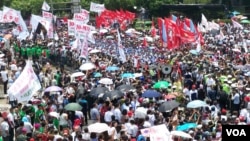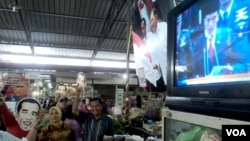In Indonesia Monday, a former furniture entrepreneur turned wildly popular politician, Joko Widodo, was officially sworn in as the country’s seventh president.
There are huge expectations and challenges ahead for Widodo, who will now lead the world’s third-largest democracy.
The inauguration of Widodo took place at the national parliament Monday and was attended by heads of state from Australia, Singapore and Malaysia, and U.S. Secretary of State John Kerry.
Celebrations included a street parade, evening rock concert and the release of thousands of paper lanterns. By midday, thousands of supporters had amassed on Jakarta’s main streets to welcome their new president.
Grassroots backing
Widodo takes the reins of Indonesia with strong grassroots backing.
Devoid of ties to the political establishment and old Suharto-era elites, the populist politician’s election is being celebrated as a momentous turning point in Indonesia’s young democracy.
Widodo's election has crystallized a sense of hope and change in Indonesia, but the new president faces steep challenges, said Aleksius Jemadu, a political analyst from Pelita Harapan University.
“I think his biggest challenge is going to be how to defend his policies and how to get the support members of parliament especially those that are on the side of the political spectrum,” Jemadu said.
Widodo, who won the July presidential election with 53 percent of the national vote, does not command a majority in Indonesia's parliament.
Parliament’s recent move to repeal an important post-Suharto election reform and end direct elections for local leaders has fueled fears that a vengeful opposition could obstruct the new president’s reform agenda and refuse to pass a budget to implement it.
With the Indonesian economy slowing to a five-year low as the commodities boom tapers, the new president is targeting a growth rate of 7 percent, and promising to improve infrastructure, cut red tape and implement delayed structural reforms.
Widodo has also pledged to take the politically unpopular decision to raise the price of subsidized fuel by 50 percent, a move that is expected to save the government almost $13 billion per year.
Clean, no-fuss image
A former businessman turned small-town mayor and later Jakarta governor before he was elected president, President Widodo has presented himself as a clean, no-fuss manager.
Widodo’s emphasis on domestic reform, said Yohanes Sulaiman, a political analyst at Indonesia’s National Defense University, is likely to leave little room for foreign policy concerns.
“Basically, he needs to get things done, which make me think or speculate that foreign policy will be like the last, his last priority I mean. He won’t really deal much on it," Sulaiman said. "It seems that is what he is focusing on at this point, more and more economic growth but very few foreign policy breakthroughs."
Widodo is widely expected to be less of an internationalist than his predecessor, Susilo Bambang Yudhoyono.
However, Widodo has consistently reiterated his commitment to an “independent and active” foreign policy and the transformation of Indonesia - a diverse nation made up of more than 17,000 islands - into a “global maritime axis.”
In his inauguration speech Monday, Widodo returned to the idea, saying: “As captain of the ship, I invite all Indonesians onboard to sail together towards a prosperous Indonesia.”
Positioned between the Indian and Pacific Ocean and with borders on the South China Sea, Indonesia is well-placed to capitalize on its maritime power.
But political analyst Jemadu said goals and capabilities are two different facets of the equation.
“In order to accomplish all his goals related to this idea, it requires a lot of capabilities, diplomatic capabilities, economic capabilities, technology, in order to support your plan or idea to be a global maritime hub in the midst of tough competition among great powers around Indonesia,” Jemadu said.
'Historic moment'
Monday’s inauguration marked the first time in Indonesia that power has been handed over from one directly elected leader to another.
Widodo promised to work hard for all Indonesians, from professionals to farmers, fishermen to street vendors, calling on all Indonesians Monday, “in this historic moment,” to work together to create a prosperous and peaceful nation.






